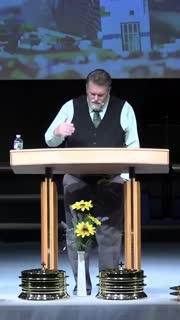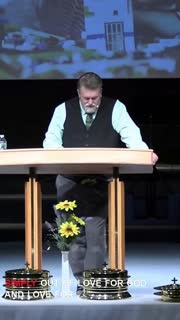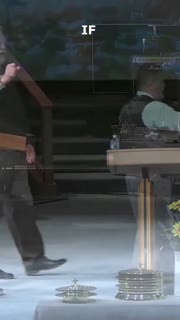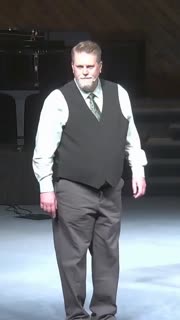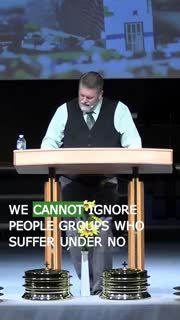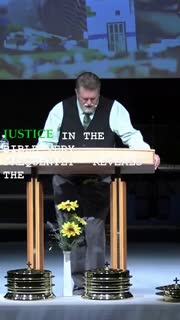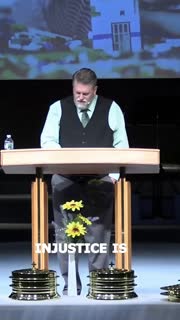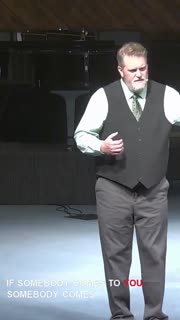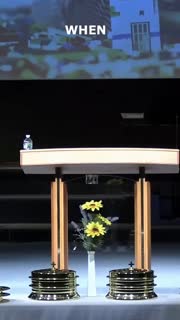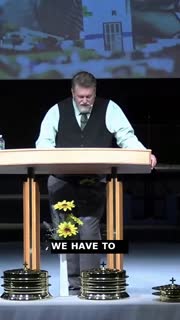Living Out God's Justice Through Generosity and Advocacy
Devotional
Sermon Summary
Bible Study Guide
Sermon Clips
### Quotes for Outreach
1. "When we look at the Bible, maybe we ask, well, who delivers this justice? Well, God does. When we look at the Old Testament, there are stories upon stories of how God renders justice in this aspect I'm talking of distributing benefits upon his children and upon the world. It happens time and time again. And by the time we get to the New Testament, we see Jesus rendering God's justice to those he comes into contact with." [11:21] (33 seconds)
2. "Simply out of love for God and love for neighbor, Christians, those who have been called justified, should be willing to disadvantage themselves to advantage the community. And we will see that the wicked are willing to disadvantage the community to advantage themselves. See, that's what separates us from the world. As Christians, we will disadvantage ourselves." [24:42] (27 seconds)
3. "If we really hold ourselves accountable as Christians, how we treat other humans, other created beings of God, it will radically change us. So we are to have universal equality. We are also to have life-changing advocacy. We are to advocate for those in need. Psalm 41, 1 begins by saying this, Blessed is the one who gives active consideration to the weak and the poor." [31:54] (37 seconds)
4. "We are to advocate for the least of us. We are to understand why they are there. We need to be brave enough to ask questions. We are to love on them like Christ loves on us. What's important to understand in this is that Christians are to see the disbursement of justice as a human right and not as charity. This should be how it shapes our view of advocating for people." [35:02] (37 seconds)
5. "We cannot ignore people groups who suffer under no or terrible health care. We cannot ignore people who live in dangerous living conditions. We cannot ignore those who cannot afford not only food, but nutritious food. Let me say that again. Sometimes, man, as a pastor, you see some things, and I know people mean well, but you need to think." [38:52] (29 seconds)
### Quotes for Members
1. "Justice in the Bible very frequently reveals the distribution of benefits based on need. Justice then is very close to love and grace. Various needy groups are the recipients of justice. These groups include widows, fatherless, resident aliens, who are also called sojourners and strangers in the Bible, the poor, the prisoners, slaves, and the sick. Each of these groups have specific needs that keeps its members from being able to participate in aspects of the life of their community." [06:48] (42 seconds)
2. "Injustice is depriving others of their basic needs or failing to correct matters when those rights are not met. Injustice is either a sin of commission, or it's a sin of self-righteousness. Injustice is a sin of either commission or omission. Let me say that again. Injustice is a sin of either commission or omission. That means, as we look out into a fallen world, that there are injustices all around us, that there are just some realities in this life, that there are horrible things that occur." [08:41] (42 seconds)
3. "If somebody comes to you, somebody comes and wants food or needs clothing, you don't go, you know, I'm going to pray for you and God will deliver. Good luck. But we do that. Church, we do that. Not that harshly, not that rudely. How many times have people come to us and say, you know what, I'll pray for that. And one, we don't pray in that moment. And then two, we don't meet a need." [17:30] (35 seconds)
4. "When you give to South Lake, we do things to help people immediately. We have what we call our front door ministry. So we have grocery cards. We have fuel cards. We have ways of helping people who are in dire straits that they are solutions, not to fix the problem, just simply to get them safe and stable. There you go. We've gone that far. That happens because of your generosity. That's why it's radical." [41:17] (34 seconds)
5. "We have to empower people. And this is very important. You see, if all we do as a church is just, well here's a grocery card, here's a fuel card. And we just give out money. We become socialists. We're just distributing wealth and not actually helping people. In our call as a church, we must empower people. We must help them break the bonds of the things that are holding them down." [42:57] (36 seconds)
Ask a question about this sermon
1. "When we look at the Bible, maybe we ask, well, who delivers this justice? Well, God does. When we look at the Old Testament, there are stories upon stories of how God renders justice in this aspect I'm talking of distributing benefits upon his children and upon the world. It happens time and time again. And by the time we get to the New Testament, we see Jesus rendering God's justice to those he comes into contact with." [11:21] (33 seconds)
2. "Simply out of love for God and love for neighbor, Christians, those who have been called justified, should be willing to disadvantage themselves to advantage the community. And we will see that the wicked are willing to disadvantage the community to advantage themselves. See, that's what separates us from the world. As Christians, we will disadvantage ourselves." [24:42] (27 seconds)
3. "If we really hold ourselves accountable as Christians, how we treat other humans, other created beings of God, it will radically change us. So we are to have universal equality. We are also to have life-changing advocacy. We are to advocate for those in need. Psalm 41, 1 begins by saying this, Blessed is the one who gives active consideration to the weak and the poor." [31:54] (37 seconds)
4. "We are to advocate for the least of us. We are to understand why they are there. We need to be brave enough to ask questions. We are to love on them like Christ loves on us. What's important to understand in this is that Christians are to see the disbursement of justice as a human right and not as charity. This should be how it shapes our view of advocating for people." [35:02] (37 seconds)
5. "We cannot ignore people groups who suffer under no or terrible health care. We cannot ignore people who live in dangerous living conditions. We cannot ignore those who cannot afford not only food, but nutritious food. Let me say that again. Sometimes, man, as a pastor, you see some things, and I know people mean well, but you need to think." [38:52] (29 seconds)
### Quotes for Members
1. "Justice in the Bible very frequently reveals the distribution of benefits based on need. Justice then is very close to love and grace. Various needy groups are the recipients of justice. These groups include widows, fatherless, resident aliens, who are also called sojourners and strangers in the Bible, the poor, the prisoners, slaves, and the sick. Each of these groups have specific needs that keeps its members from being able to participate in aspects of the life of their community." [06:48] (42 seconds)
2. "Injustice is depriving others of their basic needs or failing to correct matters when those rights are not met. Injustice is either a sin of commission, or it's a sin of self-righteousness. Injustice is a sin of either commission or omission. Let me say that again. Injustice is a sin of either commission or omission. That means, as we look out into a fallen world, that there are injustices all around us, that there are just some realities in this life, that there are horrible things that occur." [08:41] (42 seconds)
3. "If somebody comes to you, somebody comes and wants food or needs clothing, you don't go, you know, I'm going to pray for you and God will deliver. Good luck. But we do that. Church, we do that. Not that harshly, not that rudely. How many times have people come to us and say, you know what, I'll pray for that. And one, we don't pray in that moment. And then two, we don't meet a need." [17:30] (35 seconds)
4. "When you give to South Lake, we do things to help people immediately. We have what we call our front door ministry. So we have grocery cards. We have fuel cards. We have ways of helping people who are in dire straits that they are solutions, not to fix the problem, just simply to get them safe and stable. There you go. We've gone that far. That happens because of your generosity. That's why it's radical." [41:17] (34 seconds)
5. "We have to empower people. And this is very important. You see, if all we do as a church is just, well here's a grocery card, here's a fuel card. And we just give out money. We become socialists. We're just distributing wealth and not actually helping people. In our call as a church, we must empower people. We must help them break the bonds of the things that are holding them down." [42:57] (36 seconds)
